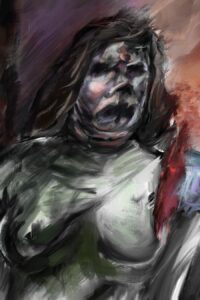“A Love Letter for My Fans”
Misery and Freedom of Expression
By Fatma Selina Demir and Zeynep Bıyıksız

Misery by Stephen King is a psychological thriller novel, written in 1987. The novel tells the story of Paul Sheldon, who is a best-seller historical romance author, and his abduction by a former nurse Annie Wilkes. The setting of the novel is a farmhouse in a desolate area. To capture the feeling of being trapped, it is also wintertime with heavy snow. Soon after Paul wakes up from his car accident which enabled Annie to take hold of him, the terror starts. The constant feeling of tension and risk of getting tortured arrays the prison rails around both Paul and the reader. Throughout the story, the relationship between Annie and Paul exhibits many possible violations against a human; mutilation, detaining, drug abuse, physical violence, starvation and oppression of thought.
Individuals create communities. Generally while thinking about the values of the EU, the individual can be overlooked. This novel indicates the suffering of an individual due to his writing. Annie claims herself as Paul’s number one fan. By saving Paul from the car crash that resulted in his every bone from the waist down getting crushed, she also takes advantage of him by making him addicted to a drug named “Novril” while he is unconscious. The dilemma of saviour/abductor starts as soon as Annie asks for permission to read Paul’s new book, Fast Cars. Annie, as the “saviour” decides to put Paul in order after reading it. This new book contains vulgar lines and violent scenes and these are the vilest things that a human being can write about, Annie believes. Annie makes Paul burn Fast Cars in a ritualistic cleansing way. This action represents how much the ideas/pressures of authorities can affect an author, and burning the book is a familiar way to exterminate a work from history. Later, she gets him a typewriter to continue his original series, Misery.
Throughout history, authors have always used their writings as their weapons and they are seen as conjoined with their writings. This idea of unity between the author and the work heavily influences the story. The typewriter becomes the reflection of Paul; whenever Paul loses a part of his limbs after Annie’s psychological seizures, the typewriter also loses its letters. The typewriter becomes Paul’s most powerful tool and weapon against Annie. After many months, Paul manages to make the first strike on Annie by hitting her with the typewriter. This is a victory against oppression: even though the writing is forced, the author will find a way to return the force. More importantly, the reason for Paul’s misery, the new book that he has written under Annie’s many interferences (Misery’s Return) becomes the fatal blow to Annie.
After managing to escape, even Paul admits that this new Misery book is his best one. He was tormented due to his freedom of expression and thoughts and ended up loving the work under the oppression of Annie, because, in the end, it was his way of revenge. In a way, the novel presents the idea that an author will survive no matter the oppressions against his/her writing.


